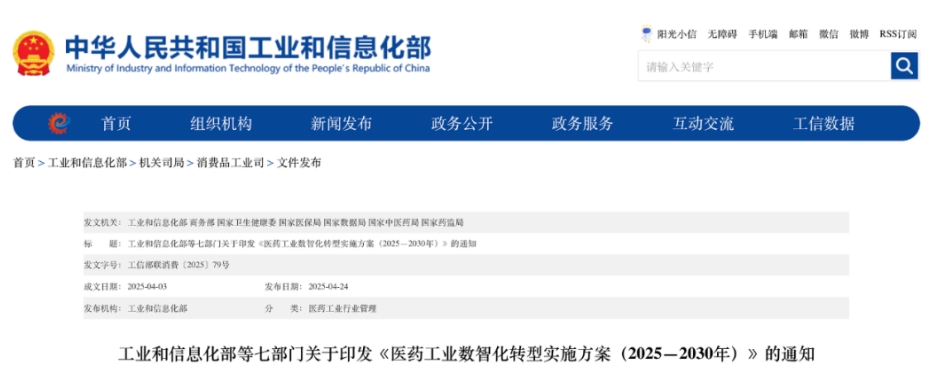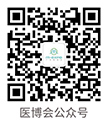In order to accelerate the digital transformation of the pharmaceutical industry, seven departments including the Ministry of Industry and Information Technology, the Ministry of Commerce, the National Health Commission, the National Healthcare Security Administration, the National Data Administration, the National Administration of Traditional Chinese Medicine, and the National Medical Products Administration recently jointly issued the "Implementation Plan for the Digital Transformation of the Pharmaceutical Industry (2025-2030)" (hereinafter referred to as the "Implementation Plan").

The Implementation Plan proposes to take the coordinated development of the entire industry chain as the main line, digital transformation as the main direction, scenario application as the driving force, adhere to planning guidance, problem orientation, classified policy implementation, and systematic promotion, coordinate the improvement of the digital development and intelligent supervision level of the pharmaceutical industry, and promote the high-end, intelligent, green, and integrated development of the pharmaceutical industry in a scenario based and graph based manner.
4 major actions and 14 tasks to assist in policy implementation and implementation
The Implementation Plan focuses on ensuring drug safety and people's health, and focuses on the deep integration of new generation information technologies such as artificial intelligence and big data with traditional pharmaceutical industry. It constructs a collaborative promotion system of "technology research and development scene promotion ecological construction intelligent supervision", and clarifies the overall goal of achieving significant improvement in the competitiveness of the entire industry chain and quality management throughout the entire life cycle by 2027. By 2030, large-scale pharmaceutical enterprises will basically achieve full coverage of digitization.
In addition, focusing on the main objectives, the "Implementation Plan" systematically proposes 14 work tasks in four aspects: empowering digital technology, promoting digital transformation, building digital service system, and improving digital supervision. These tasks include breaking through key technologies, creating 100 digital factories and 50 benchmark enterprises, establishing standardized systems and intelligent supervision models, and strengthening implementation through five safeguard measures including cross departmental collaboration, policy support, and talent cultivation. The plan is committed to building an intelligent ecosystem covering the entire chain of research and development, production, and circulation, and simultaneously strengthening the dual defense line of data security and drug quality, providing strategic support for the construction of a healthy China and the international competitiveness of the pharmaceutical industry.
Promote optimization and upgrading of various links such as research and development, production, and distribution
Against the backdrop of rapid iteration of global pharmaceutical technology and intensified industry competition, traditional production models are no longer able to meet the needs of industry development. Cutting edge technologies such as artificial intelligence can solve pain points in pharmaceutical research and development, restructure production processes, optimize circulation systems, and bring new opportunities for the development of the pharmaceutical industry.
Improve R&D efficiency and reduce R&D costs. Traditional drug development has a long cycle, high cost, and low success rate. With the application of digital technology, it is expected to significantly improve research and development efficiency, while reducing laboratory trial and error costs and optimizing resource allocation. For example, in terms of AI assisted drug design, by analyzing massive biological data through machine learning, AI can quickly screen potential drug molecules and shorten drug discovery time; In terms of virtual clinical trials, big data and digital twin technology can optimize clinical trial design, improve subject matching, and reduce trial failure rates; In terms of genomics and precision medicine, combining gene sequencing and AI analysis, pharmaceutical companies can develop personalized drugs for specific populations to improve treatment effectiveness.
Intelligent manufacturing and flexible production are widely used to promote green pharmaceuticals and sustainable development. In the production and manufacturing process, with the industrial Internet of Things technology, pharmaceutical companies can achieve intelligent management of production equipment through sensors and real-time data monitoring, improving the stability and efficiency of production lines. AI visual inspection can monitor drug quality in real-time, reduce human error, and ensure compliance with good manufacturing practices standards. In terms of personalized drug production, 3D printing can achieve customized dosage forms and improve the level of digital quality control. In addition, digital technology can help pharmaceutical companies optimize energy consumption and reduce waste emissions. For example, optimizing chemical reaction pathways through AI can reduce raw material waste. Big data analysis can also be used to optimize the supply chain and reduce carbon footprint.
Smart logistics enhances supply chain resilience, while digital marketing improves drug accessibility. With the help of blockchain traceability system in the circulation field, it can ensure the full traceability of drugs from production to terminal, preventing counterfeit drugs from entering the market. Automated warehousing systems and drone delivery can improve logistics efficiency, especially in remote areas and emergency drug supply, playing an important role in making drug circulation more efficient and patient purchasing more convenient. Driven by big data, pharmaceutical companies can develop more realistic market strategies by analyzing patient data, making marketing more precise.
Reshaping a new competitive landscape in the industry
The digital transformation of the pharmaceutical industry is not only a technological upgrade, but also an industrial revolution. From research and development to production and distribution, digital technology is reshaping every aspect of the pharmaceutical industry. This process not only accelerates industry differentiation, but also gives rise to new dimensions of competition and participants.
For traditional pharmaceutical enterprises, with the acceleration of digital and intelligent transformation, they must actively embrace change and active transformation, layout AI R&D platform as soon as possible, and change from "heavy production" to "data driven", otherwise they may be subverted by digital native enterprises (such as AI pharmaceutical companies, Internet medical platforms). In addition, flexible production lines also require high attention. If personalized drug production cannot be achieved on a large scale, traditional batch production mode enterprises will face cost disadvantages.
For small and medium-sized enterprises, AI assisted drug design, clinical trial data analysis and other tools can help them shorten the research and development cycle, reduce trial and error costs, and participate in innovative drug or niche competition. In addition, digital marketing and patient management platforms can help small and medium-sized enterprises quickly adapt to market changes and win a place in the new competitive landscape.
In addition, with the blurring of industry boundaries, new competitors will gradually emerge, and some technology companies will enter the pharmaceutical industry through AI or big data, which will lead to intensified cross-border competition.
Source: Made in China
相关推荐
- 2026 Guangzhou Medical Expo Scheduled for August! Building the Core Engine for the Greater Bay Area's Healthcare Industry. 2025-11-07
- Full-chain Empowers Industrial Innovation! The 2025 Guangzhou Medical Expo Successfully Concludes Today 2025-08-24
- Grand Opening of 2025 Guangzhou Medical and Health Industry Expo: Jointly Paint a New Blueprint for Health and Play the March of Industrial Endeavor 2025-08-22
- Over 400 hospitals and enterprises gather in the City of Rams! Guangzhou Medical Expo has become a highland for the first launches of innovative pharmaceuticals and medical devices. 2025-06-13

